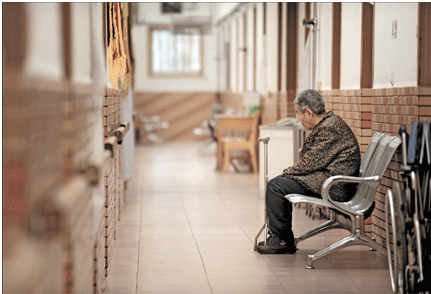|
|
 0 Comment(s)
0 Comment(s) Print
Print E-mail Shanghai Daily, November 13, 2012
E-mail Shanghai Daily, November 13, 2012
China already faces a serious problem in caring for elderly citizens in an aging society that has fewer children to care for them. Facilities are limited. A growing part of the problem are patients with senile dementia who need constant care.
 |
|
A senile dementia or Alzheimer's disease patient sits lonely in the corridor of a nursing home in Shanghai. |
Aging leads inevitably to cognitive decline as the brain shrinks and this can progress to senile dementia or Alzheimer's disease. Alzheimer's and senile dementia are often used interchangeably to refer to functional problems with language, memory and cognition. In severe, tragic cases, patients no longer recognize their loved ones, they may wander off and must constantly be attended.
There are degrees of cognitive decline and dementia.
According to the Ministry of Health, China so far has over 6 million Alzheimer's patients, ranking the top around the world, and two-thirds are women.
An estimated 9 percent of Shanghai's population of people aged 60 or older suffers some sort of physical or mental disability. That's about 410,000 seniors who need special care and the number is rising.
This is one more aspect of the growing elder care problem faced by an aging China. At this time there are insufficient facilities for elderly patients of all kinds and limited facilities for those with advanced senile dementia.
Last month, CCTV aired a series of reports on senile dementia patients in China to promote more understanding and support from the public.
"When a person is diagnosed with senile dementia, usually 60 percent of them first lose the support of their friends, and then from the family members," says Song Qi, an internist at a local hospital. "Obviously many are quite repelled by the condition, since some patients gradually lose basic living skills and their memory also fades to zero. It's a terrible thing as it turns the most familiar person into an utter stranger."
Dark days
Zhao Ziran, a 22-year college student, recalls the dark days living with her grandmother, a dementia patient, for three years.
"I love my grandmother very much. She is the one who cared for me when I was little because my parents were both busy. But this kindness cannot outweigh the sufferings she has brought to the family, through no fault of her own." Zhao says.
Anyone who hasn't lived with a dementia patient cannot realize "how scary life becomes and how the quality of life drops," she says.
Zhao says her grandmother slept during the day, so she tried to go out at night but she couldn't find her way back. Every night Zhao's mother blocked the door with a bed, so her grandmother couldn't get out.
"I didn't have a sound sleep for a year. Family life was like hell, no laughter, only sigh and resentment. When she finally passed a way a year ago, everyone felt relieved," Zhao says.
For some working families, full-time help is urgently needed. Some can afford a care-giver, while some family members have to do it themselves.
Lu Huifang, a 56-year-old retiree, says her husband was diagnosed with senile dementia two years ago. "This thoroughly changed our retirement plans for traveling around China and even the world. The cruel reality is that I have to be a 24-hour 'baby-sitter,' helping him wash his face, bathe, clean his teeth, dress him and do everything else."
He has become "like a newborn in my eyes." Her son cannot help because he is fully occupied at work, where competition is fierce and long hours are required.
"If you ask me whether I feel disgruntled, I would say yes, but I have no choice because he is my husband. If our roles were revered, I know he would do the same thing for me," she says.
It is common for family members to care for patients with severe senile dementia or Alzheimer's, but most feel helpless and are depressed by the task.
"I thought of finding an ayi to share the heavy load, but none is willing because the work is so hard and the pay so low," Liu adds.
Wang Lin, a professional in her 40s, says her biggest problem is finding an ayi for her father who has advanced dementia. Her mother died several years ago and Wang and her husband are both working.
"I know the work is hard, so I used to have two ayis - one for the daytime and the other for night," she says, adding that she paid nearly 8,000 yuan (US$1,280) each month.
But ayis still come and go because they prefer to take care of healthy people for the same salary.
Wu Ying, a 43-year-old care-giver, who charges by the hour, says she never wants to work with senile dementia patients.
Once she was asked to care for an elderly lady with dementia. All she had to do was sitting beside her because she couldn't be left alone, otherwise she would start yelling. At first she thought it was a nice job, since she didn't have to do household chores.
"But day by day, my own mood became bleaker and bleaker. Imagine, there was no sound in the room and every second seemed like a century. At last I couldn't bear it. I would rather care for lovely kids and receive lower pay," Wu recalls.
Go to Forum >>0 Comment(s)